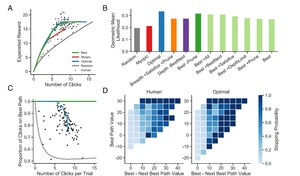Human Planning as Optimal Information Seeking
Article
re
A critical aspect of human intelligence is our ability to plan, that is, to use a model of the world to simulate, evaluate, and select among hypothetical future actions. However, exhaustive planning is intractable because the number of possible action sequences increases exponentially with the number of steps that one plans ahead. Understanding how people are nevertheless able to solve novel problems when their actions have long-reaching consequences is thus critical to understanding human intelligence. Progress in answering this question has been hampered by two challenges: planning cannot be observed and we do not have a good framework for formalizing the tradeoff between performance and computational cost. In this work, we propose solutions to both challenges, based on the idea that planning can be conceptualized as information seeking. Specifically, we model planning as the selection of information generating computations and introduce an experimental paradigm in which these computations are externalized as mouse clicks. We find that our participants’ behavior is broadly consistent with the optimal information-seeking model. We also uncover systematic deviations that might result from heuristic approximations or additional cognitive constraints that have yet to be uncovered.
| Author(s): | Fred Callawaya and Bas van Opheusdena and Sayan Gulb and Priyam Dasc and Paul Kruegera and Falk Lieder and Thomas L. Griffiths |
| Department(s): | Rationality Enhancement |
| Bibtex Type: | Article (article) |
| Paper Type: | Journal |
| State: | Submitted |
|
BibTex @article{Callaway2020Human,
title = {Human Planning as Optimal Information Seeking},
author = {Callawaya, Fred and van Opheusdena, Bas and Gulb, Sayan and Dasc, Priyam and Kruegera, Paul and Lieder, Falk and Griffiths, Thomas L.},
doi = {}
}
|
|


